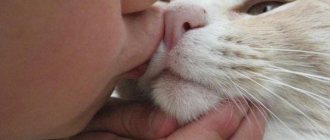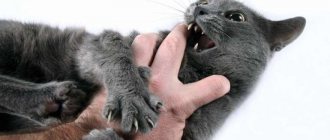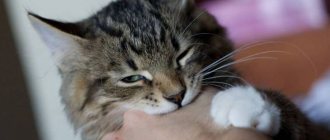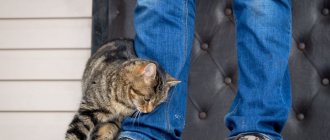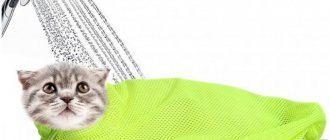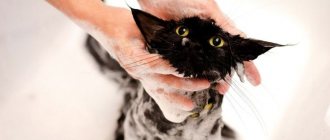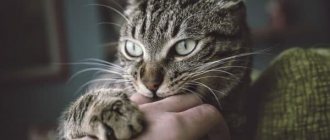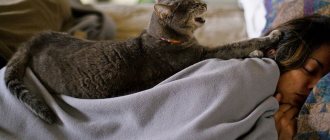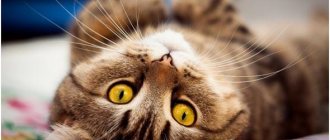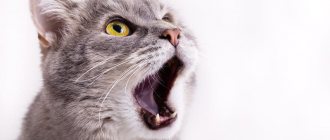Why don't cats like to ride in cars?
Cats do not like to leave their home territory.
Unlike dogs, in strange places they do not feel confident in the presence of their owner. Finding itself in an unfamiliar place, in particular inside a car, a cat cannot predict how events will develop. In addition, a cat is much more sensitive than a person to movement inside a car - she has a very keen sense of balance, so jerks and vibrations do not give her pleasure, only adding to her feeling that she is not in control of the situation. In addition to all of the above, once in the car, the cat hears unusual and loud sounds, and also smells unpleasant and strong odors.
Cats that are accustomed to traveling from childhood, especially between the ages of two and seven weeks, when they are most capable of learning and accepting new things, tolerate cars much more calmly.
Why do cats rub against their legs?
Sometimes the behavior of a cat is quite difficult for humans to understand, because they express their emotions in a completely different way. For example, why do cats rub against their legs?
? At the same time, they look like they are having great fun and purr contentedly. There are several reasons why cats rub against furniture, corners in the house and on the street, as well as people’s legs.
Smell is a very important sense for cats, sometimes even more important than vision. A person who does not have a cat at home may be surprised by some of its habits, including the habit of rubbing against pieces of furniture, corners and people's legs. This is typical for both male and female cats. So, what is the reason for this strange habit?
The reason why cats rub their feet
, is the desire to mark objects located on “their” territory. Thanks to this, the cat can subsequently recognize a familiar environment and feel confident in it.
To apply “marks,” cats use special temporal glands on both sides of the forehead, between the ears and eyes. Similar glands are also located near the corners of the lips and on the tail; they perform a similar function. That is, they secrete an odorous secretion that the cat can leave on doors, stair railings, and furniture legs. To do this, the pet rubs its head on the surface, and can also move its tail raised along the surface.
Often, wanting to show favor to a person, a cat leaves its marks on him, purring contentedly and rubbing his tail and muzzle on the person’s legs. Firstly, in this way kittens are accustomed to expressing their affection for their mother cat, and, secondly, this is how the animal identifies you as “part of its territory.”
Another reason why cats rub
, is communication between relatives. Other cats, sensing such a mark, will definitely stop to sniff, and, perhaps, leave their own nearby. In this way, they exchange information about their condition, and something else that only cats understand.
If your cat is too active in “marking” all objects in the house, the Feliway spray can help. It contains pheramones that have a calming effect on the cat. After the surfaces are treated with the spray, the pet's desire to actively mark its territory decreases.
https://animals-portal.ru/koshki/soderzhanie-i-ukhod-za-koshkoj/91-pochemu-koshki-trutsya-ob-nogi.html
Each member of the cat family has a unique character and strives for self-expression. The main means of communication is, of course, sounds: purring, screaming, hissing. However, cats also have a rich sign language that includes their tail, ears, eyes, paws, and even whiskers. Their poses, movements and facial expressions can be eloquent. Let's try to figure out what cats tell us in their body language.
Why you can't shoo away cats when they rub against you
1:5041:509
A cat is an affectionate, dependent and at the same time freedom-loving animal. Each person takes a small pet into their home for different reasons. Some people need a cat to catch mice, others to absorb negative energy, and still others bring a pet into the house as a full member of the family. But everyone has undoubtedly observed the phenomenon when a cat rubs against a person and surrounding objects.
1:1188
Why do cats rub against different objects?
2:17692:4
Absolutely all pets rub against everything in the house, thus the pets mark their territory.
After such a walk around, objects in the house receive a smell familiar to the animal. And when everything in the house smells like a cat, she feels safe. For a person, this smell is invisible, but if a strange cat gets into the house, it will clearly feel that it has entered someone else’s territory. With people it’s a different story. Cats rub against their owners for two reasons.
1. The cat marks the owner
2:8823:13863:1389
When cats rub against their owners' legs, they leave their scent on them.
3:15393:4
If a cat rubs its muzzle, body, tail against a person’s legs, and at the same time purrs, it means it is marking you too.
Pets regard their owners as part of their territory, so the scent of your pet must be present on you.
3:458
Sometimes cats pee in their owners' shoes. Many people have a negative attitude towards this, but the explanation for this is quite simple. The pet urinates in shoes to leave its scent on the owner. It’s inconvenient to pee on the owner himself, but in slippers it’s just the thing.
2. The cat shows concern
3:9514:14554:1458
Such a gesture can be a manifestation of concern for the owner. Scientists have proven that a cat rubs against its owner, thereby relieving him of poor health, mood and anger.
4:1783
This behavior can be easily noticed when returning from work. The pet meets you and begins to rub against you. It removes from the owner all the negative energy that he has accumulated outside the home.
4:336
Why can't you drive a cat away from you?
5:917
There are three opinions: why you shouldn’t drive pets away from you:
• By rubbing against you, wrapping its tail around your leg, the cat shows its care and love towards you. If you drive an animal away from you, you will greatly upset it and cause it pain.
Most often, cats treat their owners like parents. They cuddle up to you, trample you with their paws, and purr when you pet them. A kitten behaves exactly the same way with its mother.
And when you drive away your pet, you leave him perplexed: why is the person closest to me driving me away?
5:18826:507
• People are skeptical about the second version. They say that cats can heal. Some people don’t believe this, but others are convinced of this every day.
In our country, this is not given much attention, but in Western countries there is even “animal therapy” and “pet therapy”. Translated, this means treatment with animals.
When a cat rubs against your legs, it not only removes negative energy, it also relieves fatigue from them. Therefore, you should not drive away an animal that is trying to help you and ease your suffering.6:1454
Cat and Christianity
6:15006:47:512
The third option reminds us of the attitude towards cats in Christianity.
7:642
• In Orthodoxy, domestic cats have always been revered and respected. In the houses they were given a good and cozy place. The cats were never beaten or abused.
7:895
• Christians considered cats to be great divine creatures who escorted the dead to the world of death. • There were beliefs among the people that such pets were marked by the Virgin Mary herself.
7:1240
Cat with the letter M
8:1776
• In references to the early stages of Christianity, cats were depicted next to saints, so people often prayed to them. • During the plague epidemic, Francis of Assisi was saved by a cat from a rat that was infected with the plague.
From that moment on, services began to be held in churches in honor of these pets.
• There is an unusual story in history about the city of Limassol. This city was attacked by snakes. And it was cats who saved the city from the invasion of these reptiles.
Since that time, many cats have lived in this city. They are revered, respected and pampered with tasty treats.
8:9488:953
Conclusion
8:9808:985
Many people do not believe in all this, but some respectfully accept all these versions. But everyone agrees on one thing. If you have adopted a cat in your home, then the responsibilities of raising and caring for it fall on your shoulders. If, when a cat shows love, you respond in kind, then your pet will thank you more than once by catching a mouse or relieving the tension from your legs.
9:21489:4
9:109:15
Source: https://jenskiymir.com/zhivoy-mir/domashnie-lyubimcy/7067-pochemu-nelzya-otgonyat-koshek-kogda-oni-trutsya-ob-tebya.html
The Inexplicable Behavior of Cats
The pet curled up into a ball and hid its face in its paws, you opened the closet and took out a warm sweater... after all, this is a sign, such behavior promises cold. You'd be surprised how many superstitions are associated with cats. For example, in ancient Rus', a cat was allowed into the baby’s cradle so that it could lie down and rub itself. Afterwards the child was put to bed, and he slept soundly.
A cat that rubbed itself against the guest’s legs suggested that the person came with good intentions and did not keep a stone in his bosom. Perhaps this is an exaggeration, but it’s not for nothing that they say that purrs see the energy of people, and they immediately smell cruel and vile bipeds... they scream, hiss and even attack them.
The ginger cat that rubs at your feet absorbs all the negative energy. Why exactly red is unknown. Most likely, this is due to another sign that sunny cats bring happiness, wealth and good luck to the owner. Again, the red cat brings peace to the family and eliminates conflicts, calming down the “separated” husband or wife.
Cats rub their faces. Reasons why you shouldn't shoo away cats when they rub against you
It is no secret that even civilized people are often guided by instincts when communicating. The feeling of control of space near one’s own body is a natural need for safety, and tactile contact is one of the effective means of establishing close relationships.
Thus, it becomes clear why cats rub against their legs. By and large, the animal wants to make sure that you are friendly and show its emotional disposition in return. However, in addition to social reasons, there are some physiological characteristics that determine this behavior of cats.
The big secret of the little beast: why cats rub against their legs
If you watch the animal carefully, you will notice that this gesture has a special order of execution.
First, the cat presses strongly with the temporal part of its head and cheek, then, pressing with force with its whole body, it passes, touching its side, and completes the manipulation by wrapping its tail around its leg.
Raising its muzzle upward and giving you a languid look from its narrowed eyes, the cat repeats the procedure in the same order.
If in a fit of emotion you bend down to stroke her, she will do the same with your hands, pressing firmly with her nose, the edge of her lips and the top of her head. Having greeted the person, the kitty will move aside, sit comfortably and lick its fur with its tongue.
At this point, she will recognize and remember your individual scent, discreetly giving you her marks.
Physiologists explain the reason why cats rub against their legs in this way: on the animal’s body there are special secretory formations, glands that secrete an odor that is elusive to the human sense of smell.
Sharing scents with your immediate environment is important for a sense of familiarity and security. As Kipling’s hero said: “You and I are of the same blood,” which means we will protect each other and take care of our family.
Body fluids that have a special odor are also found in saliva and cat feces.
When the owners pay enough attention to the pet, feed it correctly, comb it, caress it, and pick it up, the cat does not need to assert its superiority and buries its armature bombs in the tray.
If an animal does not feel comfortable and safe enough in its territory, it uses “heavy artillery”, leaving urine marks and piles of feces in unintended places.
Thus, in cases where a cat has stopped relieving itself in the tray, the owners should not punish the animal, but should think about their behavior. It is worth somehow changing your attitude towards the animal, paying more attention to its needs, including emotional ones.
The natural grace of cats and their sweet daily rituals have become so beloved by people that they have almost begun to humanize their pets. An interesting question to consider is why cats rub against human legs. It's so cute, and at first glance it doesn't make any sense.
In the animal world, far from human understanding, having a sensitive sense of smell plays an important role for survival. Much more effective than sight and hearing, the sense of smell helps to sense the approach of prey, a competitor or a sexual partner.
With the help of smells, cats transmit information to each other about the belonging of an individual to a pride, items of personal property, as well as the boundaries of the territory. A secret with an individual smell for each individual helps to mark these boundaries.
The glands that produce a special substance are located in three places:
- Animal muzzle.
- Areas between the pads on the paws.
- Under the tail - at the anus.
Thus, when the cat begins to rub against parts of the owner’s body, he somehow leaves his scent. The same applies to its relatives, as well as various inanimate objects, including the corners of sofas and walls. This behavior means that the pet is marking its property, protecting it from attacks.
“How do cats show their love?”
From this video you will learn what signs of love cats have for humans and whether furry cats miss their owners.
Reasons for behavior
The cat ritual of wiping is somewhat similar to flirting. The pet presses its head against the owner's leg, then rubs its side, and as a finishing touch wraps its tail around the human limb.
The animal performs the same manipulations with the hands of its owner, and sometimes pokes its muzzle in the face.
This behavior has both an instinctive biological and social nature, which developed in the process of adaptation to home conditions.
To better understand cats, it is worth finding out why they continue to perform this ritual. Known reasons include:
- Marks. Just like personal belongings, toys, territory, for a cat a person is his personal property, a member of the family. When the owner is absent for a long time, his sign of belonging to the pride disappears. Purr senses this and begins to rub, correcting the misunderstanding.
- Collects information. This most often happens when guests come to the house. When coming into contact with someone new, the pet scouts the situation for a potential threat. In addition, by leaving its scent on guests, the animal adapts to their presence.
- Communicates with relatives. Domestic cats also have their own post office, and the postman is the owner. If a pet runs up to its human with a fit of tenderness, do not delude yourself. Perhaps the striped neighbor on the floor below conveyed very important news.
- Requires affection. In this case, a conditioned reflex is superimposed on the instinctive basis. It is produced by a kitten when it, marking a large and warm person with its scent, receives affection. As a result, the association is reinforced, and the animal begins to rub when it wants attention.
- He wants to eat. Here, rubbing is also associated with receiving pleasure after the ritual. However, it is not the only sign that the animal is asking to be fed. This is usually accompanied by meowing and a characteristic hungry look.
- Walking. During the period of sexual heat, females leave pheromones on their owners - messages for potential sexual partners. This is especially true for cats that do not go outside.
Interestingly, similar behavior can also occur among street animals. Often cats, on whose territory a person has set foot, thus declare their rights to him and show condescension.
Is there any danger
Having found out why cats rub against people, the next question arises: is it dangerous? If the pet is vaccinated, healthy and lives at home, then such contact will not harm either party. Although in some cases a certain inconvenience may arise, since salivation increases in overly excitable purrs.
But yard fauna can pose a significant threat to humans and their pets. From stray cats you can get:
- virus;
- fungus;
- lichen;
- helminths;
- fleas and ticks.
That is why, for safety reasons, it is recommended to avoid the attention of unknown animals.
A cat is an affectionate, dependent and at the same time freedom-loving animal. Each person takes a small pet into their home for different reasons.
Some people need a cat to catch mice, others to absorb negative energy, and still others bring a pet into the house as a full member of the family.
But everyone has undoubtedly observed the phenomenon when a cat rubs against a person and surrounding objects. Why does a pet do this, and is it possible to drive it away from you? Let’s figure it out in this article.
The fact that cats rub against furniture means that they are marking their territory.
Absolutely all pets rub against everything in the house, thus the pets mark their territory.
After such a walk around, objects in the house receive a smell familiar to the animal. And when everything in the house smells like a cat, she feels safe. For a person, this smell is invisible, but if a strange cat gets into the house, it will clearly feel that it has entered someone else’s territory.
With people it's a different story. Cats rub against their owners for two reasons.
Cat and Christianity
The third option reminds us of the attitude towards cats in Christianity.
- Christians considered cats to be great divine creatures
who escorted the dead into the world of death.Cats were believed to be great divine creatures.
- In references to the early stages of Christianity, cats were depicted next to saints
, so people often prayed to them. - During the plague epidemic, Francis of Assisi was saved by a cat from a rat that was infected with the plague
. From that moment on, services began to be held in churches in honor of these pets. - There is an unusual story in history about the city of Limassol. This city was attacked by snakes. And it was cats who saved the city from the invasion of these reptiles
. Since that time, many cats have lived in this city. They are revered, respected and pampered with tasty treats. - Christians revered cats with a pattern in the shape of the letter “M” on their heads. There were beliefs among the people that Such pets were marked by the Virgin Mary herself
.Cat with the letter M.
- In Orthodoxy, domestic cats have always been revered and respected
. In the houses they were given a good and cozy place. The cats were never beaten or abused.
Cat community, smells and marks
Pets are often forced to share territory in a completely different way than they would in the wild. And yet they were able to adapt to human requirements. But a person needs to learn to distinguish between two types of behavior: social and territorial. Where the cat begins to mark territory, the light, attractive scents of pheromones turn into foul-smelling marks.
Often marks appear when the cat does not perceive its home as a safe territory. If the owner is too detached, pays little attention to the pet, causes physical harm to it, or simply scares it. Timid cats stop petting and start marking if a new animal or family member appears in the house.
Carefully observe your pet's behavior. Where the gentle rubbing on the corner began to be accompanied by a high-raised shaking tail, it’s worth taking a closer look and sniffing to see if this is a mark. The sooner the social is separated from the territorial, the easier it will be to remove the smell of cat urine.
When it comes to labels, behavior needs to be viewed in a completely different way. Then we are no longer talking about such components of sociality as affection and requests from the cat. It is necessary to correct territorial behavior and ask a specialist how to wean a cat from marking.
Visual thinking and mind reading
Communication between cats mainly occurs at the level of mental images, supported by sounds and body movements. They invented a kind of slang for people, but they communicate with each other in their native cat language.
Cats have something like hypnosis and are even able to instill fear in their opponents. Cats can sometimes read the thoughts of their owners, because sometimes you don’t have time to think about the pet, and he’s already right there.
Cat owners have long known this ritual: when they enter the house, the tailed pet immediately runs out and begins to rub against the legs of its breadwinner. Some consider such actions to be a kind of greeting, others - an expression of the pet’s affection for its owner, and others think that this is how cats beg for food. In fact, such actions of animals are inherent in them at the biological level.
- Show all
Increased anxiety in a child
The main reason
Anxiety in a child is the constant presence of the nervous system in a protective adaptive reaction to external situations and circumstances that the child for some reason assesses as dangerous (stress reaction). The child may not be aware of them, since he grows up in them from birth, and he is used to them, but subconsciously feels restless and unsafe.
Common symptoms of increased anxiety in a child:
- Anxiety in a child is often manifested by excessive attachment to the mother, since for the child she is the natural source of calm.
- Increased anxiety may be accompanied, or, conversely, by exhaustion of the nervous system, depression, etc. The brain cannot maintain anxiety and excitement indefinitely and quickly becomes exhausted.
- Very often, excessive anxiety is accompanied by immune depression (secondary immune deficiency due to stress) and frequent illnesses. For example, a child is highly susceptible to colds, brings all the infections that appear there from kindergarten, and spends a long time at home undergoing treatment.
- An almost obligatory and most common manifestation of increased anxiety is sleep disturbance; the child has trouble falling asleep and often wakes up. Or, at first glance, he sleeps enough and a lot, but does not get enough sleep and gets up in the morning in a bad mood.
- .
First of all, it is necessary to understand in which area the causes of the problem lie. In psychological or medical
.
- Increased anxiety as a psychological problem.
- Anxiety in a child due to medical problems. This could be long-term brain damage during childbirth, hypoxia, asphyxia or birth trauma, after which the brain itself begins to generate anxiety in response to external circumstances. This may be increased intracranial pressure; in more complex situations, the causes may be autistic disorders, childhood psychoses, or even schizophrenia. And in order to help a child as effectively as possible, you need to accurately determine the nature of anxiety.
How does this happen?
We also advise you to take a closer look at how two cats who sympathize with each other behave. They “knock” their foreheads in the same way, and sometimes even intertwine their tails. At the same time, animals can purr sweetly and make other interesting sounds. When the cat leaves the room, its smell remains in the air for quite some time. So other pussies will quickly realize that the place is occupied or was occupied. Amy Shojai, a specialist whom we often refer to in our publications, regards “butting” as a way to consolidate territorial claims. With the small exception that with “territorial” marks, unique odors are usually applied to inanimate objects. And “butting” the owner is, rather, a great way to say: “You are only mine and no one else’s.”
What do scientists think about the similarities between an owner and his pet?
The fact that there is a similarity between a pet and its owner could not but interest the scientific world.
One day, Dr. Jeanie Graham Scott had a chance to visit a dog show and there she made a discovery for herself: how similar animals and their owners are to each other. This was so obvious and so surprising to the scientist that Dr. Scott wrote a book about it with illustrations made at that exhibition.
This is interesting: The unusual ritual “Dog Spinning”: what pets are guilty of
The author of the book is sure that time decides everything - how long the owner and his pet live side by side. They develop a general perception of the world and what is normal for a person becomes just as natural for a pet. Dr. Scott also added that the older dog resembles its owner more closely than he does with his own children.
What the experiment showed
Dr. Nicholas Chistenfield from San Diego came up with an interesting idea for an experiment. He took 45 photographs depicting couples - dogs and their owners. Then he separated the pairs using a computer, so that there were no clues about the connection between the frames.
The photographs were distributed to students and asked to create pairs from all those available: a dog and its owner. The students did not have any clues; they had to focus solely on external resemblance.
Among the dogs there were 25 purebreds, the remaining 20 were mestizos. Students guessed 65% of the pairs in which the dog was purebred. With mestizos the results were worse. When they began to look into it, it turned out that the unmatched pairs were those where the pet appeared by chance, that is, the dog was either given as a gift, or they had to take it into the house because there was no other way out.
Be that as it may, the fact that in the owner-animal relationship it happens that over the years they become so similar in appearance and character makes their coexistence more comfortable and allows for the formation of real emotional intimacy.
What makes a cat rub its face?
Readers loved our series of articles devoted to various cat “oddities.” Oddities can be both pleasant and not so pleasant. Some of them have become a real highlight of the mustachioed and striped pets. Something tells us that the series, originally conceived as informational and educational, will turn into something more. At the same time, we address our respected audience: please tell me which of the features of cat behavior needs detailed consideration? We look forward to your responses.
On the agenda is a truly wonderful feature of furry pets. The author of these lines is literally crazy about the fact that the cat loves to quietly come up and “butt”, rub his furry little face on his face or hands.
What do you think the cat wants to tell its owner? Let's not make guesses and assumptions, but turn to professional experts. “This is a universal complimentary behavior model,” says expert Marilyn Krieger. – The cat simply marks you as its relative. The fact is that a cat’s picture of the world is literally woven from a variety of smells. Family, home, friends and enemies all have their own scents. When a purr butts and rubs, a very subtle exchange of scents occurs. Or rather, she simply applies her own scent to the one she considers “her.” Very nice of her.”
What does this behavior mean?
It is immediately worth noting that a cat, rubbing its body against the owner’s legs like a dog, in this way puts a marker on it, marking it as personal property, inviolable property. Some pets not only rub, but also begin to lick the owner, get into the face, removing the natural human odor and leaving their own specific odor on the body.
In fact, a cat rubbing its head against its owner is not showing affection at all, but is simply trying to mark him, because peeing on a person is indecent and fraught with negative consequences. Many owners note that the animal especially actively rubs against clothes and shoes when a person comes from the street and brings various foreign odors into the house. The cat approaches the feet, catches an unfamiliar aroma with its nose, begins to actively rub its head against the legs and arms, and at the end of the ritual wraps its tail around the owner.
The same ritual is performed with other objects located on the territory of the house. The pet, wanting to leave its smell, rubs its muzzle on the corners, furniture, carpet, mobile phone, laptop, bed linen. Even the ground in the yard should be marked with a smell that seems to tell others: “This is my place, don’t you dare come here.”
Collects information
If a cat encounters an unfamiliar object on the way, while studying it, it will begin to actively rub itself, leaving its own specific odors. In this way, the animal collects important information for itself and at the same time marks. For example, having met a stranger, a pet will definitely compare the smell of the stranger with the aroma of its owner.
The opinion that a cat can be stroked and caressed as soon as it begins to rub against its legs is wrong. The animal only collects important information, and if it doesn’t like something, it can suddenly attack and bite.
Communicates
Cats also actively use scents when communicating with each other. This is a kind of language with the help of which animals learn a variety of information about their relatives.
A person, in fact, is a carrier of odorous messages for pets who live in different families. If someone else's cat constantly rubs against the owner of another cat, then the person will definitely bring important information about his cat to his pet. Many people don’t understand why other people’s cats try to touch their clothes or shoes with their cheeks or bodies. Maybe in this way they want to send or receive news from their furry friend.
Wants attention
Behind this instinct are often acquired skills. Once in a new home, the kitten immediately begins to rub against people, objects, corners, and the floor, this is how the animal marks its territory. However, a person who is not well versed in cat habits will think that he is just petting. Then the new owner begins to stroke the baby and scratch behind the ear. From childhood, a kitten develops the attitude that if it rubs against its owner’s legs, the owner will immediately begin to caress it.
Asks for food
The pleasure of affection and the satisfaction of nutritional needs are similar feelings for a cat’s perception. If the cat remembers that after physical contact with a person he is guaranteed to get what he wants, this technique will also be used to obtain food. However, when a pet begs, it also uses other signs - a loud expressive meow, a pleading look.
Sexual hunting
If a cat actively rubs against horizontally located objects, screams loudly, does not sleep, and refuses to eat, most likely she has gone into heat. During this period, the animal’s nerve endings become hypersensitive. In order to somehow reduce the tension, she begins to rub herself against corners, walls, sofas, and the legs of her owners.
Sexual heat in cats does not last long, but if the animal is not spayed or neutered, it will behave inappropriately several times a year
In such cases, it is important for the owner to be patient and try to get through this time calmly
The cat is rubbing
There are not many reasons for this phenomenon. The funny behavior of a pet usually touches the owners, but sometimes tires or irritates them. For example, if a cat not only rubs against the owner’s legs or personal belongings, but also slobbers on them. But only true cat lovers want to understand the intricacies of their behavior. Because exactly how the cat rubs you can judge the reasons for its behavior.
The cat may rub its muzzle against its owner's legs, arms or face. The cat can rise up, as if jumping, and rub against various objects. A cat can rub its muzzle and side against a person, while purring affectionately.
A cat may rub as if butting its muzzle against a person's face. The animal may rub its butt on the floor, as if repenting on the floor. Sometimes a cat rubs its back against the ground and dusty “puddles”, as if rolling out in the dust.
These actions are performed for different purposes and for different reasons.
The reasons for this behavior of the animal
Cats are territorial predators. They mark their territory with urine and specific odorous substances that are secreted by endocrine glands. For cats, smell is a “friend or foe” recognition system.
The cat's whiskers, that is, its whiskers, are covered with such volatile compounds. There are glands on its face that secrete substances so that the cat can mark its territory, objects and people that belong to it.
The pet quite sincerely believes that people belong to her, and not vice versa. Therefore, the cat rubs its muzzle, standing up on its hind legs, and as if falling forward. This way it activates the glands that secrete odorous substances.
In a similar way, she rubs against the corners of buildings and cabinets, various objects and the legs of her owner. When meeting a person from work, she tries to destroy other people’s unpleasant odors on his clothes and skin, trying to “reward” him with “her” smell, the aroma of pride.
The cat rubs against its personal belongings almost every day: food tray, house, etc.
Kittens and young cats that have not had time to assert themselves rub against a person’s hands, poke their faces into his arms or legs, because they need protection and patronage. They caress, hoping that in return the person will give them protection and make them a companion.
Although the cat is considered to be a "walking on its own" animal, it is social to a certain extent. That is, it needs communication.
A domestic cat can satisfy its need for communication and energy exchange only by playing with its owner. Or by climbing onto his lap and allowing himself to be caressed.
With a lack of attention, the animal can vigorously rub not only against the owner, but also various objects, fidget around the floor, attracting attention.
By rolling in the dust and shaking the ground, bathing in “puddles” of dust, the animal may try to remove static electricity that periodically accumulates on the fur.
Some breeders notice that a new thing in the apartment causes increased interest in the cat. She sniffs it, rubs her muzzle against it. The reason for this behavior is also the smell that comes from the new thing. The cat tries to make the thing “its own” on its territory, in addition, this is how the animal gets to know the new thing in the house.
A cat may rub against its owner's legs in the kitchen if it is very hungry or wants to try a delicacy from the table. This is how she shows her request, showing affection mixed with persistence.
The causes of friction are not always harmless. It happens that this behavior is caused by pathological conditions that cause discomfort to the cat.
Friction is pathological if it is intrusive in nature, the animal gets tired of it and wears out the skin to small abrasions.
Normally, the animal falls at the owner’s feet or objects in the house no more than 2-4 times a day. In diseases, friction occurs almost hourly and lasts for a long time.
By the way, in this case, the cat usually rubs not only its muzzle or body, but also its anal area on the floor, its head on the walls, and rubs its own parts of the body with its paws.
With pathological friction, the cat’s behavior also changes, and other symptoms are added. The owner should pay close attention to the cat’s condition if the following symptoms are observed:
- the cat has become lethargic and apathetic, or, on the contrary, it is overly intrusive, and aggressiveness may appear;
- the animal does not purr when rubbed, plaintive meows may appear;
- the cat refuses to eat and does not allow the sore spot to be touched;
- lacrimation appears, eyes and ears fill with pus;
- Vomiting and diarrhea appear.
Pathological friction is a sign of itching or discomfort that can be caused by:
- parasites;
- ear mites, due to which cats experience severe itching;
- inflammation of the glands of the anorectal zone;
- constipation associated with bowel disease, foreign objects and other problems;
- pain in the eyes as a result of injuries and inflammatory processes (in this case, the cat will rub its muzzle against the corner and continuously touch its muzzle and eyes with its paws);
- when there is pain in the ear, the cat will press the sore spot to the ground or floor and try to rub it in this way, while breeders often note a plaintive meow;
- an allergic rash causes severe itching all over the cat’s body, so the animal can rub not only its head, but also its body, roll on the floor, turning from side to side;
- pain in the head is manifested by a desire to rub the top of the head against various objects and the hands of the owner.
A swallowed plastic bag is especially dangerous for an animal. It can clog the intestines, interfering with the movement of food and its digestion. It can partially block the intestines and even partially protrude from the anus, irritating the receptors of the anorectal zone. The worst thing is that swallowed polyethylene is not visible on x-rays. And this problem is difficult to determine even for a specialist.
Sometimes cats, especially long-haired ones, rub contaminated areas of their bodies against objects in an attempt to clean themselves. This is especially noticeable when the cat rubs its butt on the floor, jumps up, and tries to reach the anus. Most often, this behavior is caused by the fact that part of the feces is entangled in the fur and irritates the animal.
Long-haired cats have another problem. If they are not combed out in time, the fur can become matted and block the anus, interfering with bowel movements. In this case, the cat may rub its butt in an attempt to empty its bowels.
Symptomatic treatment
If, along with friction, other alarming symptoms appear, the cat should be shown to a specialist. When the correct diagnosis is made and after adequate treatment, the pathological friction will disappear.
To eliminate allergic itching, you need to identify the allergen and eliminate it from the animal’s life as quickly as possible. To quickly relieve symptoms, antihistamines are prescribed.
If the friction is associated with stress or excessive anxiety of the cat, it should be calmed down. Light preparations in the form of valerian or motherwort will have a beneficial effect on the animal.
When abrasions and scratches appear on the animal’s body due to pathological friction, they should be treated with antibacterial drugs, but strictly after consulting a specialist.
It also wouldn’t hurt to introduce a complex of vitamins and microelements into your diet. Thanks to this, the fur on the damaged area will be restored, the animal will get stronger, and the cat’s mood will improve.
Symptomatic diet and procedures
If the cat needs the attention of the owner, this does not require treatment, you just need to spend 15-20 minutes playing with your pet. A person is responsible for those whom he has taught. And his responsibility is not only to feed and treat the pet, to provide him with decent living conditions, but also to create psychological comfort for him.
Parasites require special antiparasitic therapy. If a cat has constipation, the animal should be taken to a veterinarian to clarify the diagnosis, proper treatment, and select a diet.
If the cat is long-haired, its fur needs to be looked after in a timely manner.
If the animal behaves inappropriately after visiting the tray, you need to examine it, and if lumps of feces are found under the tail, simply remove them.
It is worth carefully monitoring the condition of the skin, eyes and ears of your pets. To prevent diseases, the animal must be shown to the veterinarian at least once a year.
A cat's diet should be varied; you should not feed your cat low-grade food and semi-finished products.
Thanks to the observance of these simple rules, the cat will rub against the owner’s legs solely in connection with surges of tenderness, the desire to leave its mark on the territory and if it is in a good mood.
Cat Rubbing
Source: https://nld.ru/koshki/bolezni/simptomy/tretsja/
Opinion of zoopsychologists
Animal psychologists often express their assessment of this phenomenon. Most associate this ritual with the peculiarities of the relationship between a mother cat and her cub. Already at a more conscious age, the pet partly sees its parent in its owner. That's why he rubs against it, showing gratitude and care. But the young inhabitants of the streets are in this way trying to get a little affection and human attention.
Also, according to animal psychologists, the reason for this habit may lie in the behavioral characteristics of the animal. It is tactile contact that is most preferable for a cat in the process of expressing its own emotions and sensations. This means that when a pet rubs against a person’s legs, he wants to show his feelings. This theory is confirmed by the fact that many self-sufficient cats do not demonstrate such rituals at all.
By the way, the absence of this habit can also be indicative. It often indicates such things:
- lack of trust;
- temporary resentment;
- dissatisfaction with the conditions.
But performing the ritual 1-2 times a day clearly indicates that the cat is happy and does not need anything. Of course, there are also much more active individuals who rub often, clearly showing warm feelings towards the owner. Such pets show their love in other ways.
Animal psychologists also suggest that a cat rubs its legs when it wants to get more data about the world around it. This is especially noticeable when the animal finds itself in an unfamiliar environment. At this moment, you can clearly see how wariness develops into curiosity, and the cat gradually begins to rub against various objects and people present. In fact, the pet is trying to adapt to the new and calm itself. Various odors are especially disturbing for cats.
Why you can't shoo away cats when they rub against you
A cat is an affectionate, dependent and at the same time freedom-loving animal. Each person takes a small pet into their home for different reasons.
Some people need a cat to catch mice, others to absorb negative energy, and still others bring a pet into the house as a full member of the family. But everyone has undoubtedly observed the phenomenon when a cat rubs against a person and surrounding objects.
Why does a pet do this, and is it possible to drive it away from you? Let’s figure it out in this article.
Why do cats rub against different objects?
The fact that cats rub against furniture means that they are marking their territory. Absolutely all pets rub against everything in the house, thus pets mark their territory.
After such a walk around, objects in the house receive a smell familiar to the animal. And when everything in the house smells like a cat, she feels safe.
For a person, this smell is invisible, but if a strange cat gets into the house, it will clearly feel that it has entered someone else’s territory.
With people it's a different story. Cats rub against their owners for two reasons.
The cat marks the owner
When cats rub against their owners’ legs, they thus leave their scent on them. If a cat rubs against a person’s legs with its muzzle, body, tail, and at the same time purrs, it means it is marking you too.
Pets regard their owners as part of their territory, so the scent of your pet must be present on you.
British cats have a strong character, but they are not averse to rubbing against their owner’s legs! Sometimes cats pee in their owners' shoes. Many people have a negative attitude towards this, but the explanation for this is quite simple. The pet urinates in shoes to leave its scent on the owner. It’s inconvenient to pee on the owner himself, but on slippers is just the thing.
The cat shows concern
In addition, such a gesture can be a manifestation of concern for the owner. Scientists have proven that a cat rubs against its owner, thereby relieving him of poor health, mood and anger.
This behavior can be easily noticed when returning from work. The pet meets you and begins to rub against you. It removes from the owner all the negative energy that he has accumulated outside the home.
Why can't you drive a cat away from you?
There are three opinions: why you can’t drive pets away from you: You can’t drive a cat away or show aggression towards it. By rubbing against you, wrapping its tail around your leg, the cat shows its care and love towards you.
If you drive an animal away from you, you will greatly upset it and cause it pain. Most often, cats treat their owners like parents. They cuddle up to you, trample you with their paws, and purr when you pet them. A kitten behaves exactly the same way with its mother.
And when you drive away your pet, you leave him perplexed: why is the person closest to me driving me away?
In no case is it recommended to drive the cat away or show aggression, because it demonstrates its care. People are skeptical about the second version. They say that cats can heal. Some people don’t believe this, but others are convinced of this every day.
In our country, this is not given much attention, but in Western countries there is even “animal therapy” and “pet therapy”. Translated, this means treatment with animals. When a cat rubs against your legs, it not only removes negative energy, it also relieves fatigue from them.
Therefore, you should not drive away an animal that is trying to help you and alleviate your suffering.
When cats rub against their owners, they also relieve fatigue and negative energy. Cat and Christianity The third option reminds us of the attitude towards cats in Christianity.
Christians considered cats to be great divine creatures who escorted the dead to the world of death.
Cats were believed to be great divine creatures. In references to the early stages of Christianity, cats were depicted next to saints, so people often prayed to them. During the plague epidemic, Francis of Assisi was saved by a cat from a rat that was infected with the plague.
From that moment on, services began to be held in churches in honor of these pets. In history there is an unusual story about the city of Limassol. This city was attacked by snakes. And it was cats who saved the city from the invasion of these reptiles. Since that time, many cats have lived in this city.
They are revered, respected and pampered with tasty treats.
There were beliefs among the people that such pets were marked by the Virgin Mary herself.
Cat with the letter M. In Orthodoxy, domestic cats have always been revered and respected. In the houses they were given a good and cozy place. The cats were never beaten or abused.
Conclusion
Many people do not believe in all this, but some respectfully accept all these versions. But everyone agrees on one thing. If you have adopted a cat in your home, then the responsibilities of raising and caring for it fall on your shoulders. If, when a cat shows love, you respond in kind, then your pet will thank you more than once by catching a mouse or relieving tension from your legs.
Source: https://megalife.net.ua/2018/10/11/pochemu-nelzya-otgonyat-koshek-kogda-oni-trutsya-ob-tebya/
The meaning of smells in the cat world
Let’s immediately make a reservation that the cat rubs against the owner’s legs in order to mark him as property and inviolable property! Cats (and dogs too) have three “sources” of personal odor - secretions secreted by glands on the face, between the toes and on the surface of the anus. Another “ink” to mark the territory is urine, which has no “significant” odor without the secretion secreted by those same paranal glands.
Sometimes, odorous substances are called pheromones; this interpretation is a little incorrect, but sometimes it is appropriate. Some, especially territorial cats, not only rub against their owner, but also lick him. Particularly passionately, the pet eliminates the smell of sweat under the arms and on the legs. We can explain the not entirely hygienic process by the same desire to mark a person with one’s smell.
Symptomatic treatment
If, along with friction, other alarming symptoms appear, the cat should be shown to a specialist. When the correct diagnosis is made and after adequate treatment, the pathological friction will disappear.
To eliminate allergic itching, you need to identify the allergen and eliminate it from the animal’s life as quickly as possible. To quickly relieve symptoms, antihistamines are prescribed.
If the friction is associated with stress or excessive anxiety of the cat, it should be calmed down. Light preparations in the form of valerian or motherwort will have a beneficial effect on the animal.
When abrasions and scratches appear on the animal’s body due to pathological friction, they should be treated with antibacterial drugs, but strictly after consulting a specialist.
It also wouldn’t hurt to introduce a complex of vitamins and microelements into your diet. Thanks to this, the fur on the damaged area will be restored, the animal will get stronger, and the cat’s mood will improve.
Why are cats attracted to specific smells?
Attentive owners of furry pets may have noticed that cats show special interest in smells that are unusual, in human opinion. For example, cats love the smell of dirty clothes, unwashed socks or sweaty armpits. Thus, some kittens and adult pets like to sleep on unwashed linen, put their muzzles in shoes or enjoy “poking” into the armpits, while preferring more male ones. What causes this behavior, why do cats lick their armpits?
shutterstock
First of all, don’t be scared and think that your pet has gone crazy. The thing is that representatives of the cat family have a much better developed sense of smell than humans. Cats can detect odors and aromas that are not sensitive to our noses and at the same time feel them much more strongly.
Through new scents, cats navigate in space and adapt to environmental conditions.
Smells can attract or, conversely, repel cats. For example, cats simply adore human sweat. Animals like the smell of their owner's clothes and shoes. It is worth noting that such “scents” attract more adult cats than kittens. Babies show less interest in strong aromas and use their owner's clothes or socks as new toys.
Small gifts in the form of killed animals
Often cats, especially those that live in rural areas and have constant access to the street, bring killed mice, lizards or other small animals to their owners
At the same time, owners mistakenly believe that pets, behaving in this way, are trying to curry favor with them, showing their importance and significance.
2022 Nissan Kicks: Tough Design and New Equipment for Less
“Fluffy” fat is needed, but in small quantities. 4 types of fat and how to lose them
Roast Chicken and Other Dishes You Can Make with Leftover Champagne
In reality everything is different and much more touching. Domestic cats, no matter what dog breeders say about their character, become quite strongly attached to their owners. As a result, they bring killed small animals for them to feed, because they see that a person himself cannot catch a mouse or a lizard for dinner. This is how cats show their care for their owners.
Signs
There are many popular signs and superstitions about cats and their behavior towards humans. Here are a few that involve skin-to-skin contact:
- If a cat rubs against a person, and he shows reciprocity, in this way the animal transmits positive energy, and, on the contrary, takes away negative energy;
- If a person pushes away an animal trying to rub against his legs, he drives away luck, strength, luck;
- When a pregnant cat rubs against your legs, it promises a person quick luck, financial gains, and a big win;
- If a strange cat comes into the house and tries to rub itself against the residents, walls, floor, this indicates that evil spirits live here;
- When a cat tries to rub against a person’s face and warily sniffs the air exhaled by him, this indicates the onset of the disease;
- If a dirty, thin, mangy cat wants to rub against a person, it means he or someone close to him will soon get sick.
Cat body language: emotions expressed without words
Cats can't talk because they don't need to. They are quite capable of expressing all their emotions through body language and facial expressions. That is why communication with a cat comes down to understanding its gestures and actions, which can be a whole spectrum.
Cat body language consists of communication using the head, ears, paws, tail, posture and, of course, the eyes. At the same time, communication with a cat should be based on understanding the complex of all gestures as a whole, besides, the animal always tries to express its emotions quite unambiguously.
Conventionally, the body language of cats can be divided into two groups - gestures that are directed directly at the owner (the cat licks his hand, hisses, rushes, rubs), or those that the cat makes as if in relation to itself, but so that the owner I could understand her easily.
